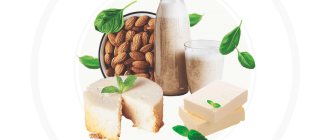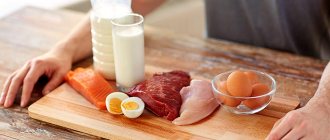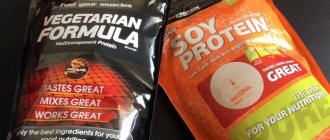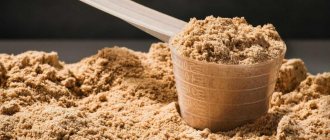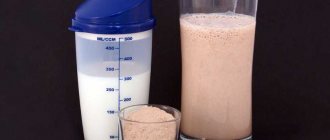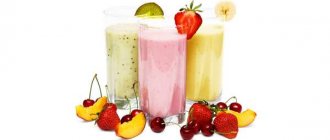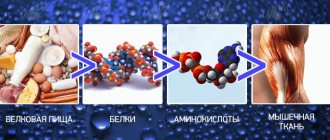Author: article provided by the store sportivnoepitanie.ru 2014-11-27 Views:
13 599
Grade:
5.0
| Medals articles >> |
Articles are loading...
As you know, the primary task when gaining lean muscle mass is to provide the body with enough protein. It is the consumption of protein foods that ensures a positive nitrogen balance - the main criterion on which depends how quickly our muscle tissue will recover and how quickly new muscle fibers will form. This article will focus on animal protein, namely beef.
Features of beef protein
This type of protein is obtained by ultra-concentration method from beef meat. By its nature, beef is a high-protein source (19 g of protein per 100 grams of product) with a low fat content. Beef meat contains creatine, so the supplement is additionally enriched with creatine monohydrate to enhance the anabolic effect. The thing is that creatine retains water and visually increases muscle volume, and also adds strength.
Beef protein supplements come in the form of isolate or hydrolyzed beef protein, partially digested, which speeds up the process of amino acid absorption, which lasts no more than half an hour.
Protein in the dairy department
Greek yogurt
Protein content: 10 g per 100 g product
Once the liquid is removed, delicious and thick Greek yogurt contains twice the protein of the regular version of this dairy product. In the load you get probiotic microorganisms that are beneficial for the intestines and calcium necessary for bones.
Good to know.
Plain Greek yogurt contains three times less sugar than its flavored counterpart.
Cottage cheese
Protein content: up to 20 g per 100 g of product
Made from curdled milk, this product is chock-full of casein, a slow-digesting protein that provides growing muscles with a constant supply of essential amino acids. Make cottage cheese your main treat, especially before bed.
Good to know.
Cottage cheese is notoriously high in sodium, but you can compare package labels and choose the one with the lowest amount of the mineral.
Swiss cheese
Protein content: 30 g per 100 g product
Each gram of Swiss cheese gives you more protein than other varieties available in the supermarket, making it the best muscle-building ingredient for sandwiches and sandwiches.
Good to know.
If you're concerned about the calories in full-fat Swiss cheese, choose low-fat varieties. The ratio of protein to fat in them is approximately 8 to 1, but the taste does not suffer from this.
Eggs
Protein content: 6 g in 1 large egg
These white balls are almost perfect muscle food. All thanks to the high biological value - an indicator that tells how much protein in food can be converted into protein by our body. The biological value of eggs is higher than any other product in the supermarket. The determining factor in biological value is the content of essential amino acids, and the humble egg contains more than enough of them.
Good to know.
Look for packages of eggs fortified with omega-3 acids. This will make your morning scrambled eggs even more beneficial.
Milk, 2%
Protein content: 8 g per glass
Milk remains a trusted source of premium protein, with a biological value only slightly inferior to eggs. But why drink watery, tasteless skim milk when you can enjoy the rich taste of 2% milk without going over your fat limit. In addition, milk fats will help your body absorb fat-soluble vitamins from whole milk, such as vitamin D.
Good to know.
Experiments show that cows raised on organic, natural feed produce milk that contains more nutrients, including omega fats.
Soy milk
Protein content: 8 g per glass
Most artificial dairy products contain cat-cry protein, but soy milk is a welcome exception to this rule. If you do not drink cow's milk for objective reasons, for example, because of lactose intolerance, try pouring soy milk into oatmeal or other cereals. Plus, you can use it to make post-workout smoothies.
Good to know.
To minimize the amount of gut-bloating sugars, look for a product labeled “sugar-free.” And if you're trying to avoid genetically modified foods, look for soy milk labeled "organic."
Pros and cons of beef protein
Main advantages:
- Quickly saturates the body with a complete complex of amino acids.
- Absorbed in 30 minutes, allowing you to take the supplement immediately before training to saturate yourself with all the necessary substances.
- Contains creatine, which has a positive effect on muscle mass and strength gain.
- Maintains a high nitrogen balance necessary for anabolic processes.
Flaws:
- Due to the presence of creatine and the high carbohydrate content in the composition, the supplement is completely unsuitable for weight loss and work on relief.
- Causes side effects in the form of gastrointestinal upset.
- Some additives have a bitter taste.
- Mix only with water.
- Relatively high cost.
Top 5 best meat protein producers
Muscle Meds Carnivor
Beef protein isolate is formulated with nitrogen retention technology to improve anabolism. The product does not contain fat, milk sugar, or cholesterol. One serving (32.5 g) contains: 116 calories, 6 g carbohydrates, 23 g protein, creatine monohydrate, BCAA, maltodextrin, soy lecithin, sucralose. Cost for 908 g – 2400 rubles; 1816 – 4100 rubles; 3632 g – 7200 rub.
Scitec Nutrition 100% Hydro Beef Peptide
The supplement contains hydrolyzed beef peptide protein isolate - 25 grams per serving, 1.5 g fat, 4 g carbohydrates, potassium and sodium. Also contains BCAAs. The cost of the supplement for 900 g (30 servings) is 2000 rubles; for 1800 g (60 servings) – 3500 rubles.
Platinum 100% Beef Protein
One 32 g serving of hydrolyzed beef protein contains: 110 calories, 3 g carbohydrates, 24 g protein, 3 g creatine, vitamin A, C, calcium, sodium, whole brown rice powder. Does not contain sugar, fats or cholesterol. The cost for 908 g is 3500 rubles.
Dymatize Elite Primal
Beef protein consists of a mixture of hydrolyzed peptides, hydrolyzed beef protein, and beef albumin. One serving contains 27 grams of protein, BCAA, 3 g of creatine monohydrate, providing a high rate of anabolism, sodium, calcium, iron. Does not contain fats and cholesterol. Cost for 924 g – 1500 rubles; for 1832 - 4010 rubles.
SAN Titanium Beef Supreme
Beef protein hydrolyzate contains BCAA, glutamine, creatine monohydrate. Minimum fat and carbohydrate content. The cost for 947 g is 2090 rubles, 1838 g is 3950 rubles.
Protein in the canned food aisle
Anchovies
Protein content: 24 g per 85 g serving
Compared to other foods, these tiny swimmers are the surprise winners when it comes to canned protein. Due to their small size, they do not accumulate toxins, as large fish species do.
Good to know.
To prevent anchovies from being so salty, soak them in their own juice for 30 minutes; then drain the water and dry gently.
Corned beef
Protein content: 24 g per 85 g serving
The impressive protein content of this salted beef is sure to strengthen your muscles. And no, it's not the same as canned meat!
Good to know.
Try sautéing corned beef with chopped vegetables and serving it over rice, or use it as the main ingredient in sandwiches.
Light tuna
Protein content: 22 g per 85 g serving
Frugal shoppers take note: Cheap canned light tuna actually contains more protein than more expensive canned white tuna.
Good to know.
To reduce calories from junk oil, choose tuna in its own juices instead of seafood in oil.
Chicken
Protein content: 21 g per 85 g serving
For a quick injection of high-quality protein into your sandwiches and salads, rely on white meat chicken.
Good to know.
Compare products from different manufacturers, choosing those that contain less salt.
Sardines
Protein content: 21 g per 85 g serving
Canned sardines are often overlooked, although they are not only rich in protein, but also provide the body with omega-3 fats and vitamin D. Research shows that in high dosages, vitamin D can stimulate testosterone production.
Good to know.
Look for tasty and convenient sardines in cans.
Dark blue beans
Protein content: 20 g per glass
Beans are a fantastically cheap source of protein, and among the most affordable canned legumes, blue beans hold a firm lead. One glass contains an impressive 13 grams of dietary fiber.
Good to know.
Some manufacturers do not use the stabilizer bisphenol A in production.
Dried lentils
Protein Content: 13 g per ¼ cup
Cheap dried lentils, often categorized as canned proteins, will boost your protein intake while also providing fiber and a variety of essential vitamins.
Good to know.
Unlike dried beans, lentils do not require annoying soaking. Just soak it in water for about 20 minutes until it becomes soft. For a nutritious breakfast, combine lentils with turkey or chicken breast, vegetables and lemon dressing.
How to take it to gain muscle mass?
Beef protein has enough advantages for gaining weight, but it is not able to replace all kinds of sports supplements and become the only anabolic assistant.
- Due to the creatine content, 1 serving of the supplement is taken half an hour before training to provide a surge of strength, similar to a pre-workout complex. Creatine retains water in the sarcoplasm, due to which the athlete can work with more weight. Accordingly, there is no point in using creatine supplements to close the protein-carbohydrate window.
- The second serving can be taken in the morning, regardless of training. Rapid absorption of amino acids helps prevent morning catabolism and provides essential nutrients for further muscle growth.
